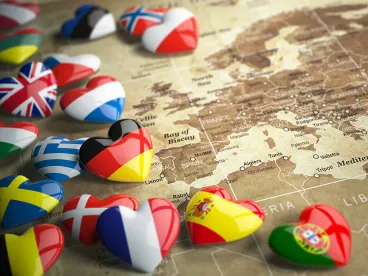With the turn of the year, France took over the Presidency of the Council of the European Union (EU), following Slovenia. The Council consists of a representative of each Member State at ministerial level and is the EU co-legislator together with the European Parliament. While it is the European Commission, EU executive, that has the power to propose new EU legislation, the co-legislators in principle get to amend and adopt such proposals. The Presidency of the Council rotates between EU Member States every six months. It drives forward the Council’s work on EU legislation and ensures the continuity of the EU agenda (in cooperation with the European Commission and Parliament). Practically, the main tasks of the Council Presidency are to plan and chair the about 2000 formal meetings and 150 informal meetings and conferences of the Council and its preparatory bodies during its six months and to represent the Council in its relations with other EU institutions.
In turn, France will be followed by the Czech Republic and Sweden. The three countries form the so-called Council ‘trio’, a system established in 2009. They set long-term goals and agreed on a joint agenda for an 18-month period.
According to its programme titled ‘Recovery, Strength and a Sense of Belonging’, the French Presidency has three high-level ambitions:
-
A more sovereign Europe (including in security and defence),
-
A new European model for growth (in which economic development is aligned with climate goals and that supports innovation and the growth of European digital players and sets its own rules for the digital world), and
-
A humane Europe (without discrimination).
The presented programme is meant to be in line with the 2022 Work Programme of the European Commission for 2022 (and its Annex; please see Sustainability Outlook October 2021).
Regarding sustainability policy, the French Presidency says it will continue to “enforce” the European Green Deal, the broad climate, energy and environment policy agenda presented by the European Commission in December 2019. The French Presidency will coordinate work around four main components:
-
Accelerating the transition to a decarbonised economy to become climate neutral by 2050;
-
Bolstering measures to preserve biodiversity;
-
Promoting a more circular and sustainable economy; and
-
Achieving the transition towards a healthier environment.
On decarbonisation, the Presidency wants further negotiations on the ‘Fit for 55’ legislative package. This can be interpreted as indicating that France is not confident that it will be able to conclude the negotiations in this extensive package of legislative proposals, similarly to Slovenia half a year ago. Under the heading energy priorities, France states that it is convinced that nuclear is a critical tool to decarbonise the European industry, meet emissions reduction targets and strengthen energy sovereignty and independence.
Regarding biodiversity, France wants to initiate or progress in negotiations for regulations on deforestation-free products and on the reestablishment of ecosystems, as well as prepare Council conclusions on the EU position during the COP15 of the UN Convention on Biological Diversity, as well as other international conventions.
On the circular economy, the Presidency wants to speed up negotiations on the Batteries Regulation, which “has a high level of ambition in terms of reducing the carbon footprint […] and the strategic autonomy of the EU”. France plans to “continue to examine” the revision of the Waste Shipments Regulation and to begin negotiations on the Sustainable Products Initiative. It will also follow up on the Commission’s Strategy for Sustainable Textiles, which would support the sector in its recovery. France will “endeavour to defend” a high level of European ambition within the framework of the United Nations Environment Assembly (UNEA-5), and wants to initiate negotiations on a binding international treaty on marine litter and plastic pollution within the framework).
As part of its work for a healthier environment, France wants to better take into account the fight against endocrine disruptors in all EU legislation, begin work on the revision of regulations on ozone-depleting substances and fluorinated greenhouse gases, continue with amendments to the Regulation on Persistent Organic Pollutants (POPs) and coordinate the work in the framework of multiple international conventions on chemicals.
An unusual aspect of the next six months will be that France will elect a new President and National Assembly during its Council Presidency. The country will hold its presidential election on 10 April, most likely followed by a second round on 24 April. The two rounds of the National Assembly election will be held on 12 and 19 June. The incumbent French President Emmanuel Macron, who has been in office since 2017, leads in recent polls, but with just 26%, among a broad field of presidential candidates. His current prospects for the second round depend somewhat on the other candidate who will proceed to it: He leads 57% to 43% against Marine Le Pen (Rassemblement national), and 53% to 47% against Valérie Pécresse (Les Républicains).




 />i
/>i
